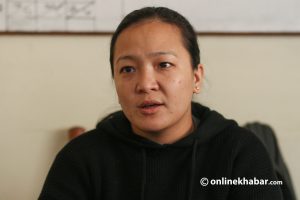Mohini Sharma, 26, still vividly remembers the day when her boyfriend forcibly took her to Kathmandu on his bike from Banepa, her hometown, one casual afternoon a few years ago.
“He was angry because I came to Banepa to visit my sick uncle without informing him,” says Sharma, who used to stay in Kathmandu with her brother and sister-in-law, “The demeaning words he used during the ride still echoes in my head. I wish to forget that day, yet it haunts me time and again.”
Sharma, a media person in Kathmandu who has asked us to hide her real name in this story, says her relationship with the man was okay until that day. “He looked always perfect and romantic,” she says, “He used to ask me many things about my day. I thought I would never get a man who cares so much about me.”
But, after the incident, she says, “It grew as a cage for me. I couldn’t speak up against him or seek help even from the family and friends as I was scared of losing my and my family’s prestige. I thought if he could insult me in the middle of the market, he could also come to my house just to defame me.”
She stayed silent until she reached her limit. “Then, after four years of surviving the toxic relationship, I came out.”
Experts and stakeholders working in the human rights sector of Nepal say Sharma’s case is the tip of the iceberg. Intimate partner violence goes unnoticed in Nepal as violence in a marital relationship is taken for granted traditionally, and the same value system is being replicated in unmarried relationships. They suggest it is high time society educated people, teenagers in particular, about the long-term impacts of such violence so as create happy, healthy relationships.
Pervasive presence
Psychosocial counsellor Radha Basnet, who has been handling such cases for the past seven years, says intimate partner violence is affecting hundreds of people in romantic relationships, both married and unmarried. These cases, however, rarely get reported as societal norms and values do not favour that, according to her.

Yet, the data of reported cases are also already alarming. As per the National Women Commission’s recent factsheet, men were accused as perpetrators in around 90 per cent of 5,515 cases of violence against women reported from November 2017 to September 2021. Among the accused, 66 per cent were intimate partners: boyfriends or husbands. This shows intimate partner violence is pervasive in Nepal.
Inspector Anu Lama, the chief of Women, Children and Senior Citizen Service Center (WCSC) of Nepal Police, also supports the claim that intimate partner violence is a big problem in Nepal. She says most of the cases that come to her centre are of domestic violence; in the last fiscal year only, 2,246 cases of domestic violence were registered. “Around 80 to 90 per cent of the survivors had been facing violence from the known persons, mainly husbands or boyfriends in live-in relationships.”
“And, this is not the first time that such incidents are happening to them,” she says.
Endless endurance
Counsellor Basnet says intimate partner violence survivors rarely resort to reporting in the early stage of violence. There are two major reasons: Nepali society reinforces the idea that issues within a couple should be solved within them; then, many are still not aware of support services.
“In general, they come after experiencing five to six years of facing physical, psychological and economic violence.” After they see no end to the violence happening to them for years, it becomes very difficult for them both psychologically and physically to bear any longer. Then only, they seek help.

Many women surviving intimate partner violence fear their relationship will go from bad to worse once the violence is reported to authorities as the alleged perpetrators want to take vengeance, according to Lama.
Basnet says, “Along with this, they are afraid that they will lose their security. But, the more they tolerate, the more it encourages the perpetrator to do violence. The survivors usually come here (to the counsellors) at a stage when they have no respect and love left towards their partners.”
Both Lama and Basnet observe the issue of intimate partner violence in live-in relationships is becoming alarming. “They live together without marriage. They have neither any legal right nor social recognition. It has caused a huge problem recently,” says Basnet.
Nirijana Bhatta, the vice-president of Yuwalaya, a youth NGO that has conducted a couple of surveys about intimate partner violence, says, “Having a romantic partner before marriage is not accepted by our society. Therefore, many teenagers and youth keep their relationships a secret. In such a case, many think if they speak up against their partners in any case, their secret will get revealed and this will lose their prestige.”
Interestingly, some men have also survived intimate partner violence, but that is less severe as it rarely involves physical violence in their case. “They usually reach here because of the unbearable mental torture from wives’ extramarital affairs, not taking care of children, alcohol addiction and all,” says Lama.
Crucial causes
Shreejana Gnawali, a sociologist current based in the Academy of Korean Studies (AKS), studied various factors associated with intimate partner violence in Nepal. She summarises her observations, “There are a lot of factors: social, economic, individual and others that are associated with the problem. Female illiteracy, low economic status, violent family history, and a lack of decision-making autonomy, husband’s educational level, alcoholism, and a high number of children are some of the factors that lead to intimate partner violence.”

Gnawali also says the women living in the Terai and belonging to the underprivileged communities and castes are at greater risks of intimate partner violence.
Likewise, Basnet adds, “The causes of intimate partner violence in the cases I have handled have been doubts and suspicions. The husbands who are abroad to work do not trust their wives; therefore, they remain contactless for years and instead accuse the wife of extramarital affairs and all. Also, we have seen the tendency of protecting the perpetrators by the families themselves.”
As per her, intimate partner violence is a result of wrong socialisation. When the children reach the stage when they are aware of their sex, the boys are taught to be bold whereas you want girls to be soft. In the process, gender ideas are linked with norms and values and unseen power creating fear in them. “This kind of thought is developed in them that they have to tolerate every verbal, physical, sexual and psychological abuse done by their husbands and boyfriends,” says Raut.
Likewise, Basnet shares that the survivours have become habituated with violence as they see it is happening to other women also in her family and surrounding as well.
The need for awareness
As many women are unaware that intimate partner violence is a problem, proper communication and counselling can be helpful in minimising such incidents, according to Basnet.

She adds, “But, when a woman seeks help from authority, her partner does not acknowledge his wrongdoings, instead doubts of extra affairs. Hence, men also should be aware of this.”
Likewise, Gnawali suggests that there is a need for the formation of context-specific policy and intervention programmes. She also views awareness and acknowledgement that intimate partner violence is a problem and it is not something to tolerate can be a key to mitigating this in Nepal.
Meanwhile, Raut thinks school curricula should be gender-neutral. Also, neutral socialisation should happen at home.
“The change should happen in all micro-macro institutions, and it will take time.”


























